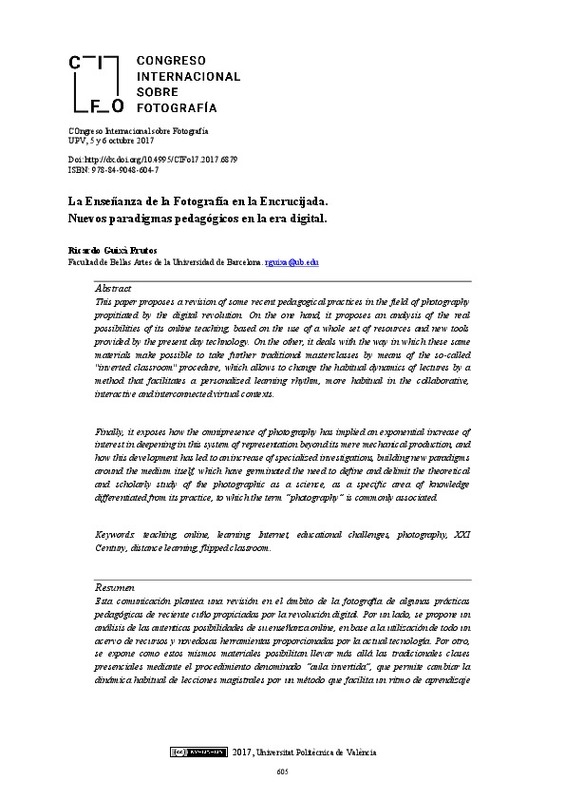JavaScript is disabled for your browser. Some features of this site may not work without it.
Buscar en RiuNet
Listar
Mi cuenta
Estadísticas
Ayuda RiuNet
Admin. UPV
La Enseñanza de la Fotografía en la Encruzijada. Nuevos paradigmas pedagógicas en la era digital
Mostrar el registro completo del ítem
Guixà Frutos, R. (2018). La Enseñanza de la Fotografía en la Encruzijada. Nuevos paradigmas pedagógicas en la era digital. En I Congreso Internacional sobre fotografía. Nuevas propuestas en investigación y docencia de la fotografía. Editorial Universitat Politècnica de València. 605-619. https://doi.org/10.4995/CIFo17.2017.6879
Por favor, use este identificador para citar o enlazar este ítem: http://hdl.handle.net/10251/115460
Ficheros en el ítem
Metadatos del ítem
| Título: | La Enseñanza de la Fotografía en la Encruzijada. Nuevos paradigmas pedagógicas en la era digital | |
| Autor: | Guixà Frutos, Ricardo | |
| Fecha difusión: |
|
|
| Resumen: |
[EN] This paper proposes a revision of some recent pedagogical practices in the field of photography propitiated by the digital revolution. On the one hand, it proposes an analysis of the real possibilities of its online ...[+]
[ES] Esta comunicación plantea una revisión en el ámbito de la fotografía de algunas prácticas pedagógicas de reciente cuño propiciadas por la revolución digital. Por un lado, se propone un análisis de las autenticas ...[+]
|
|
| Palabras clave: |
|
|
| Derechos de uso: | Reconocimiento - No comercial - Sin obra derivada (by-nc-nd) | |
| ISBN: |
|
|
| Fuente: |
|
|
| DOI: |
|
|
| Editorial: |
|
|
| Versión del editor: | http://ocs.editorial.upv.es/index.php/CIFo/CIFo17/paper/view/6879 | |
| Título del congreso: |
|
|
| Lugar del congreso: |
|
|
| Fecha congreso: |
|
|
| Tipo: |
|








